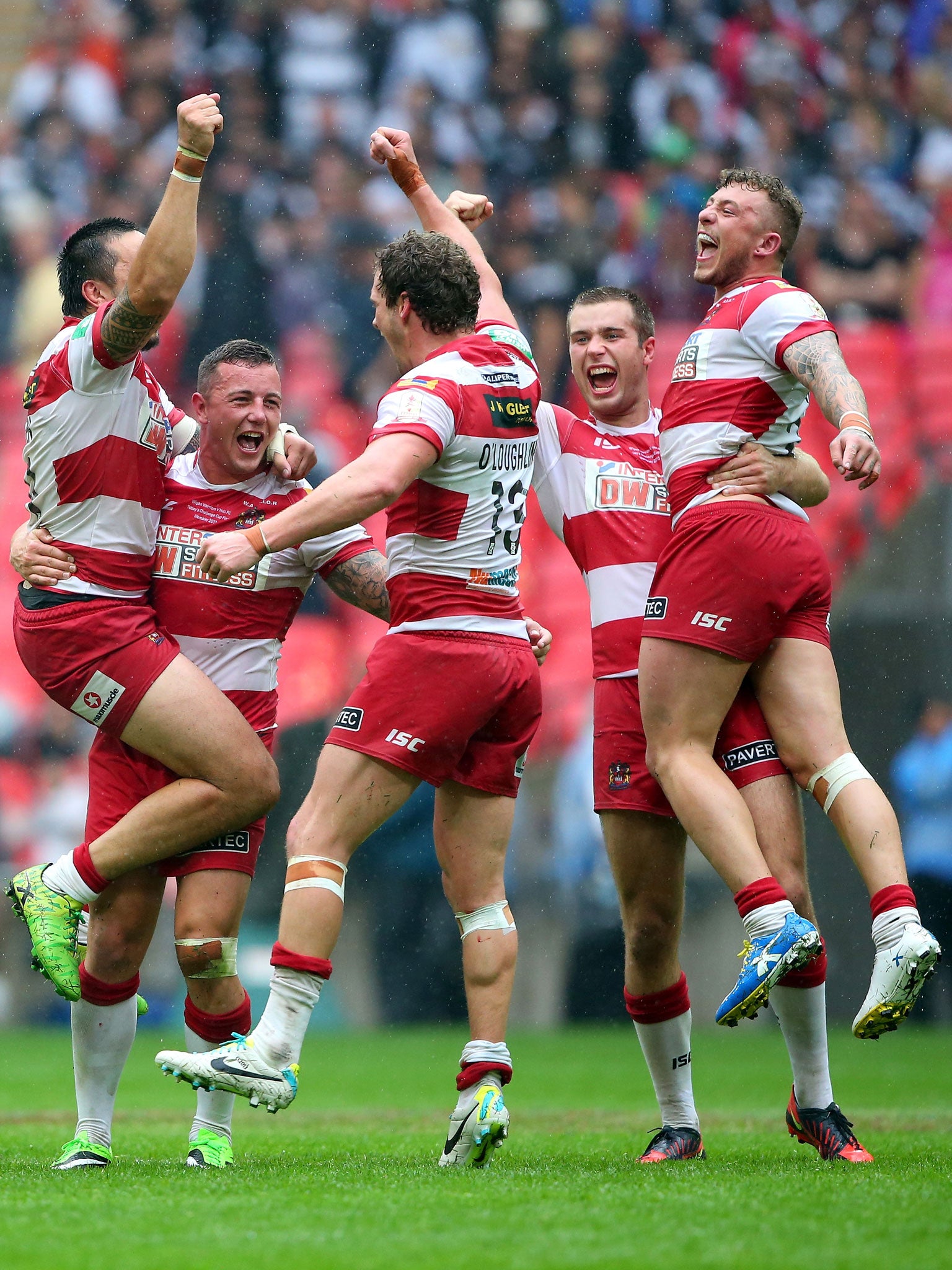The Calvin report: A prisoner of geography fluffs its chance to shine
League serves its community but uninspired final bypasses the neutral

Tribal rituals were observed at Wembley yesterday in what was the sporting equivalent of a Moonie wedding or a May Day military parade in honour of the Dear Leader in Pyongyang. Commitment to the sacred tenets of the self-styled “greatest game in the world” was absolute and unyielding.
Admirable sentiments, shame about the spectacle. Rugby League did not get the Challenge Cup final it craved. Wigan won it for the 19th time without engaging the imagination of the neutral. That will probably cost Hull coach Peter Gentle his job, but the greatest price will be paid by the sport itself.
The match was overshadowed by the need to make the most of the code’s day release from the ghetto of satellite television. It had attritional urgency without possessing the vibrancy required to appeal to an extended audience. The athleticism was unrelenting, yet as a showcase it lacked subtlety and invention.
The sight of Wembley’s corporate tier virtually deserted, betrayed the strains of a search for wider acceptance. Even the occasion’s dominant character, Wigan full-back Sam Tomkins, had an air of transience. He scored one of only two tries in the final minute, but refused, curtly, to discuss his future, which is assumed to lie either in Australian Rugby League, or domestic rugby union.
It is easy to scoff – indeed it is almost obligatory to do so south of the Watford Gap – but rugby league’s qualities, in an age of plastic fans, synthetic emotion, unreconstructed greed and absentee ownership, should not be denigrated casually.
Despite its search for credibility, this is a sport in tune with its community. It has not succumbed to football’s get-rich-quick mentality, though it would probably be tempted to do so if given the chance. Shirt sponsorship is the province of local institutions, such as East Yorkshire Scaffolding Ltd, rather than multi-national corporates who couldn’t identity “their” club on a map.
Wembley Way in the rain was a cross between a works outing and an annual reunion of extras from Phoenix Nights. The only southern accents could be traced to the ticket touts doing cautious business in the underpass. The prospect of upsetting a collection of men in XXXL rugby shirts ensured their usual jauntiness was kept under tight rein.
Abide with Me was sung lustily and reverently as the teams waited in the tunnel. Its familiar cadence, and sentiments, transported this observer back to childhood, when my father’s side of the family would descend from the game’s Cumbrian garrisons on an annual pilgrimage.
Wembley was the antithesis of Whitehaven, a small club which fielded a succession of distant cousins. It had a glamour which has subsequently been shredded. A generation later, rugby league remains a prisoner of geography.
The sport yearns for the fleeting warmth of the spotlight. It offers TV viewers dressing-room access, an insight into previously unseen rituals. Yesterday’s referee, Phil Bentham, even had a camera attached to his bald head, just above his left ear.
Yet, without commercial growth and a broadening of its base, such innovations are of limited value. The central weakness of the sport was encapsulated by the Challenge Cup semi-final, in which Wigan embarrassingly ran up 70 unanswered points against London Broncos, who are the likeliest victims of plans to reduce Super League from 14 teams to 12 from the 2015 season.
Acceptance that decades of missionary work in the capital has been fruitless will be painful. But reality must be faced. There is a legitimate debate to be held about whether rugby league needs a Wembley showcase and its implications of corporate indifference.
The pretences of the forthcoming World Cup, where games will be staged in such outposts as Neath, Workington, Leigh and Limerick, will be highlighted by those with a vested interest in its marginalisation. The sport returns to Wembley on November 23 for an international double-headed semi-final that is being marketed as the Big Hit.
Hull, habitual underdogs because of a failure to win seven previous Wembley finals, needed to demonstrate more than the art of defending, a combination of arm wrestling and guerrilla warfare. Tomkins was taken out early in the first half, but Wigan, who led at half-time through an Iain Thornley try, returned the compliment by levelling Daniel Holdsworth.
The hits were intense and the rain was persistent. Handling became a lottery. Though Bradley Wiggins, whose Wigan club tie discreetly betrayed his allegiances, would have recognised the dedication to the craft and the willingness to place bodies on the line, it was little more than human dodgems.
Wigan’s win means that, uniquely, the DW Stadium now houses the FA and Challenge Cups. The problem is that Rugby League needed more than a trivia question as the legacy of its big day out.
Join our commenting forum
Join thought-provoking conversations, follow other Independent readers and see their replies
Comments
Bookmark popover
Removed from bookmarks